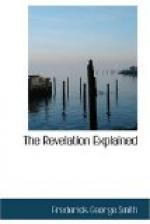Another promise to this congregation was, “I also will keep thee from the hour of temptation, which shall come upon all the world.” Some dreadful calamity is here predicted, during which the power of God would be mercifully manifested in granting this church a special preservation. Some suppose it to have reference to a great general persecution throughout the Roman empire, during which the Christians of Philadelphia would be spared. This may have been the fact; but whether it was or not, we have no means of information. When we come to consider the symbols of chapter 9, in which the delusive error of Mohammedanism is set forth, we will see what a period of sore trial this delusion was to the Eastern churches. It is also a fact that, in the midst of this abounding heresy, the church of Philadelphia was preserved as was no other church of Asia. When the followers of Mohammed were sweeping like a whirlwind over the Eastern empire, ravaging everything before them, Philadelphia remained an independent Christian city, when all the other cities of Asia Minor were under the power of the Saracen sword. It held out against the Ottoman power until the year 1390 A.D., when it surrendered to Sultan Bayazid’s mixed army of Ottoman Turks and Byzantine Christians (?). This was six years after the death of Wickliffe, “the morning star of the reformation,” who opposed the corruptions of the Papacy, gave the world the first English translation of the Bible, and sowed the seeds that soon grew and produced a Huss, a Jerome, and a Luther. So God preserved the Christians of Philadelphia in the East until he began raising up others to herald his truth in the West, whose labors soon ripened into the glorious Reformation of the Sixteenth Century.
His final promise to the overcomer is that he shall be made a pillar in the temple of God, and receive the name of God, of Christ, and of the New Jerusalem, or city of God. In some manner the Christian is labelled with the name of God, whose property he is; with the name of Christ, by whom he was purchased; and with the name of the New Jerusalem, or city of God, his inheritance and eternal abiding-place; and he is made a pillar in the temple of God. By turning to Heb. 12:22, 23, we find that the general assembly and church of God in this dispensation constitutes, in one important sense, the New Jerusalem, or city of God, in which the overcomers abide. “But ye are come unto Mount Sion, and unto the city of the living God, the heavenly Jerusalem ... to the general assembly and church of the first-born, which are written in heaven.” The church is also styled the house or temple of God, composed of people out of all nations who “are built upon the foundation of the apostles and prophets, Jesus Christ himself being the chief corner-stone; in whom all the building fitly framed together groweth unto an holy temple in the Lord ... for an habitation of God through the Spirit.” Eph. 2:20-22. See also 1 Cor. 3:17; 1 Pet. 2:5; 1 Tim. 3:15.




